 Stefan Feld is known for complex games involving a subset of randomness through dice rolls. Usually his designs encompass some trading of resources to complete objectives along with upgrades to improve actions. There’s usually some kind of economic backdrop that aids in fading the theme to the background. A new title from Tasty Minstrel Games sets some of this pattern aside.
Stefan Feld is known for complex games involving a subset of randomness through dice rolls. Usually his designs encompass some trading of resources to complete objectives along with upgrades to improve actions. There’s usually some kind of economic backdrop that aids in fading the theme to the background. A new title from Tasty Minstrel Games sets some of this pattern aside.
The Oracle of Delphi is a pick-up and deliver race game for 2-4 players and takes about 100 minutes to complete. It plays best with 3 players.
Game Overview:
Players, acting as ancient mythological Greek heroes, are racing against each other to complete twelve tasks. They roll dice to take actions hoping to be the most efficient at combining tasks in nearby locations. The player to complete all twelve first and return home wins.
Game Components:
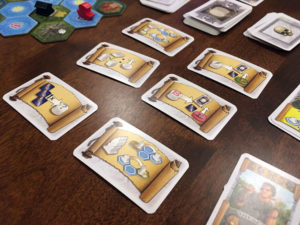
There are a significant number of components for The Oracle of Delphi and all are pretty standard fare for a good quality Eurogame. The wooden ships, dice, shrines (houses), discs, and statues (the sole unique model) are adequate and familiar. The cardboard tokens, map, and player boards are of good quality stock. The small cards are well designed and straightforward.
What should be noted is that the graphic design is extremely well done. For the amount of information and color choices necessary, the organization of information is exceptional. The one negative in this is that the colors red and pink are extremely close (this could be an issue at the printer). It takes very sharp eyes to see the difference. On a brighter note, the game is color blind friendly with many symbols to accentuate colors.
How to Play:
After assembling the board and seeding spaces with wooden tokens of various types, each player places their boat on the statue of Zeus space to begin play. Players will also prepare their boards with each player setting the same twelve tasks (randomly chosen) at the top of their board. Each turn thereafter is relatively straightforward.
Check Injury Cards – If a player has 3 injury cards of the same color or 6 injury cards total, they skip the entirety of their turn and discard 3 injury cards. If a player has 0 injury cards, they gain a favor token to help manipulate their dice. Injury cards are gained from attacks by the Titan (see Consulting the Oracle) or by fighting monsters.
Perform Actions – The bulk of a player’s turn involves using dice (or Oracle cards representing bonus dice) to take actions. The values of these dice can be manipulated by using favor tokens. Each die activates one action. In addition, the extensive actions available depend on the color of the die used.
These actions below require a die of a specific color, specifically the color of the target item. If the action taken completes one of a player’s tasks, that task tile is returned to the box.
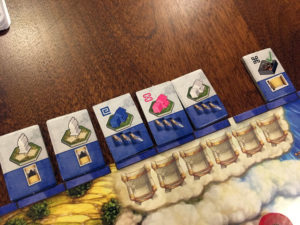
Move the Ship – Up to 3 spaces away to a space of the selected color.
Fight a Monster – Roll dice to defeat a monster of the selected color.
Explore an Island – The island’s color must match the selected color.
Build a Shrine – Place a shrine from the player board onto an adjacent space of the selected color.
Load an Offering – Acquire a cube of the selected color from an adjacent space.
Make an Offering – Place a cube from the ship on an Offering space of the selected color.
Load a Statue – Put a statue of the selected color from an adjacent space on the ship.
Raise a Statue – Place a statue on a target location of the selected color.
Discard Injury Cards – All cards of the selected color
Advance a God – Move a god on the player board god track of the selected color. If a god reaches the top of the track, as a free action, a player can use the god’s bonus.
The following actions do not require a die of a specific color.
Draw an Oracle Card – To be used as extra die on a later turn.
Take Two Favor Tokens – Favor tokens manipulate dice by changing them to a different color. Each token used advances the color of the die clockwise on the player board color wheel.
Look at Two Island Tiles – To determine the appropriate space for a shrine, a player may look at facedown island tiles.
Consulting the Oracle – Unless a player had 6 injury cards, the end of each turn involves rolling three Oracle dice in preparation for the next turn. Also, the last player in the round rolls a die for a titan attack. Players who don’t have enough shield value to fend this off take an injury card. If another player has advanced a god or gods of a color matching one of the dice results, they can advance one of those gods on their god track.
Once a player has completed all twelve tasks and returned to the Zeus space, the round is allowed to finish to determine a winner. If only one player managed to return, then that player wins. If more than one player has completed everything and returned, ties are broken by the number of Oracle cards acquired.
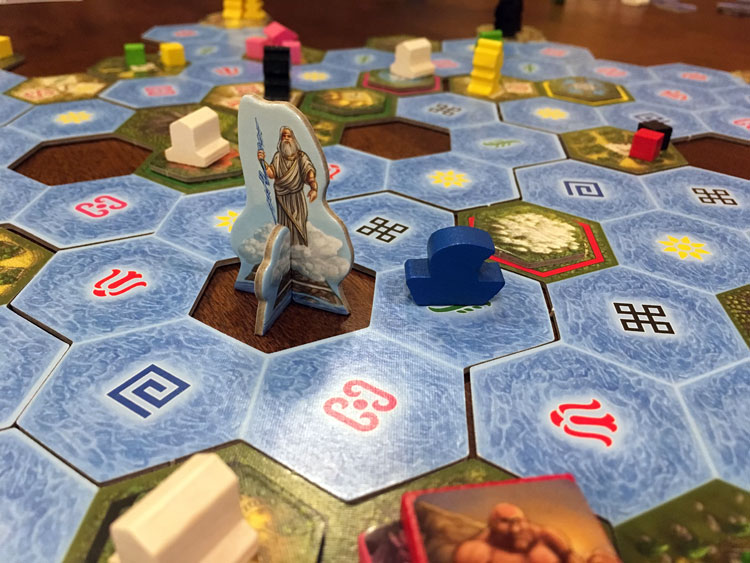
Game Experience:
The surprise at seeing Stefan Feld’s name attached to this design ends as soon as players experience the game’s mechanisms. There are lots of tasks which have a cursory connection with the theme, but, really, they are mechanical objectives completed through decisions based on a random dice roll. The theme, while admirably not economic, is easily switched to something less heroic. This is familiar for Feld and somewhat disappointing, given that the ancient Greek myths have a lot to offer in terms of story and engagement.
This continues when comparing the different objectives offered to players. Three out of the four objective types have lots of similarities. Players acquire knowledge or a thing and then figure out where to deliver a thing. The other type of task is simply to show up and roll some dice to fight a monster.
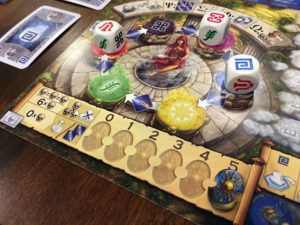
Hopefully, on their journeys, players have improved their fighting skill to make this task easier. The disconnection of theme and mechanisms here feels purposefully anti-visceral, distilling a fight with an epic beast or a journey spanning many years down to a series of dice rolls.
But for those who do enjoy the mechanisms of dice rolls and decision-making, there is plenty to feast upon. The evaluation of the game options and the dice rolled each turn is extremely engaging. Judging the right time to mitigate dice rolls or take a more patient route to achieve objectives keeps play tense. There is constant observation of opponent actions to see how close others are to completing their objectives.
The random map is another aspect of the game that keeps the tension. There’s no way for players to plan pre-game the best way to play since the map and the objectives are randomized. However, this doesn’t keep each game’s strategy from feeling similar.
Finding the optimum path for taking on objectives is key and the scope of mental challenge doesn’t deviate from game to game. As such, different games are hard to distinguish from memory.
Final Thoughts:
The Oracle of Delphi is a good game. The pick-up and deliver aspects of the game are well done and challenging. However, it’s like observing an efficient engine with very little to inspire the imagination. For gamers who enjoy the complexities of the journey and need little in the way of theme or story, this is exactly the kind of game for them. It doesn’t run par for the course with other Stefan Feld titles, but it feels Feldian in the mechanisms to achieve game objectives.
If you’d like to pick up a copy of The Oracle of Delphi, you can get it for about $40.
Final Score: 3 Stars – A complex romp through Ionian seas doesn’t deliver much theme, but gets it right for fans who enjoy the challenge of repeated pick-up and deliver.
 Hits:
Hits:
• Tough decisions in pick-up and deliver
• Variable board layout
• Easy to use graphic design aids play
Misses:
• Game objectives have little variation
• Little implementation of theme
• Color issues discerning pink and red



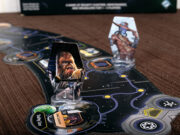






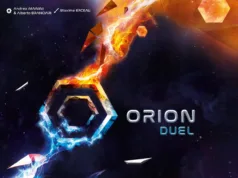













Just curious, maybe it’s correct but you have “multiple games can feel samey” as a positive
Thanks Brennan. Sorry that should have been taken out. I’ll fix it.